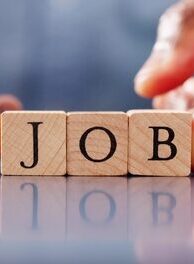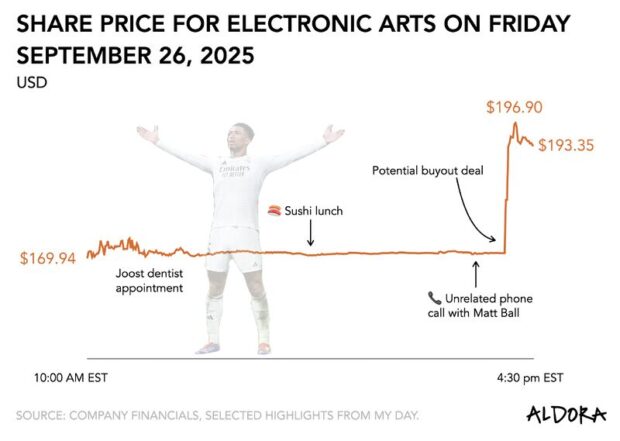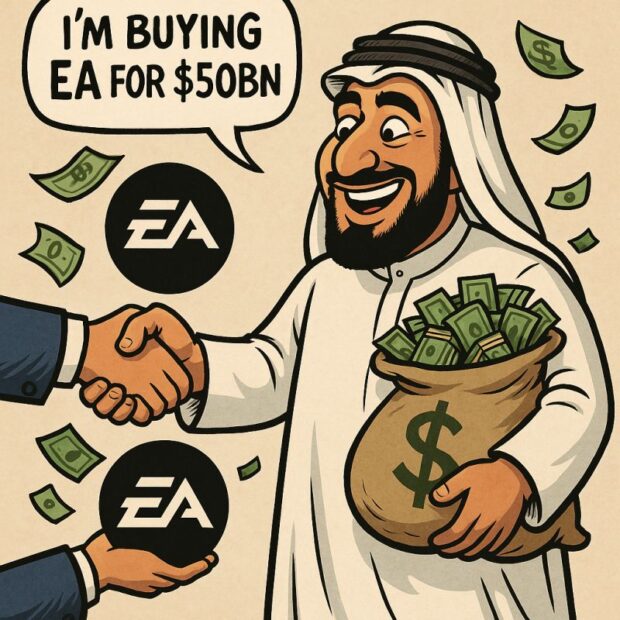
Doesn’t play, still wins
Journal 3 Joost van Dreunen May 20
Zelnick’s gamer status matters less than his segmentation strategy.
Take-Two CEO Strauss Zelnick doesn’t play video games. That’s what made headlines.
Some were surprised to hear such a candid admission from the head of the second-largest publicly traded game publisher in the U.S.
Should it, though?
I’ll admit, I’ve asked people the same question for years. It is a quick litmus test at conferences: Do you actually play games, or are you just here for the open bar? Too often, vendors (think: payment processors, ad tech firms) show up at major gaming events without the faintest clue about the industry they were trying to sell into.
Internally, it was an unofficial screening tool during hiring. Sure, having a new analyst who knows the space helps. But more than raw talent, cultural fluency matters. If you don’t know what your clients are publishing, or worse, you’ve never even played a title they make, it’s hard to build real trust. You don’t need to be president of the fan club, but you do need to speak the language.
Still, strategic distance has its merits.
For instance, after all the Metaverse hype, Meta’s employees avoided using Horizon Worlds despite leadership mandates. As Kelly Stonelake, former Director of Product Marketing, put it: “employees [did not want] to use Horizon, and leadership [demanded] it happen anyway, instead of addressing the reasons for reluctance and workarounds.” When your own team won’t touch the product, that’s not just a marketing challenge. It’s a red flag.
In that light, internal adoption is a sanity check. Your team is the first focus group. If they’re not curious about what they’re making, why should anyone else be?
But would Take-Two be better off if Zelnick were up at 2 a.m. replaying Grand Theft Auto V, then barging into the studio the next morning with design notes no one dares challenge because, well, he’s the CEO?
Probably better he doesn’t.
On to this week’s update.

NEWS
Take-Two reports $1.58 billion in earnings
Showing strong momentum heading into a pivotal year, Take-Two Interactive posted bookings near the top of guidance.
The star of the show here wasn’t Grand Theft Auto, but NBA 2K. According to CEO Strauss Zelnick, the game “now has an online component that has extended the period of engagement from what used to be three months to basically 12 months.” By taking a cohort-driven approach, rather than a one-size-fits-all model, the game saw an 80% year-over-year increase in average sessions per player, turning personalized engagement into higher spend. Recurrent consumer spending rose 14% YoY, with NBA 2K’s in-game spend jumping 42% and full-game units outperforming last year’s installment by 7%.
Mobile surprised to the upside, growing 3% instead of declining. Even so, development costs had increased and squeezed margins. Titles like Dragon City and Two Dots continue to punch above their weight, according to management.
Looking ahead, fiscal 2026 guidance came in below Wall Street expectations, primarily due to what analysts view as overly conservative forecasts for full-game releases. Management signaled modest contributions from upcoming titles like Borderlands and Mafia, despite historical evidence to the contrary (Borderlands 3 sold 5 million units in five days, and Mafia 3 moved 4.5 million in its first week). Instead, executives are emphasizing a “durable earnings base” and pointing investors to FY27, when GTA 6 will launch and fundamentally reset the company’s earnings baseline.
In an interview with Christopher Dring, Zelnick summed up their creative velocity with characteristic bravado: “I’d argue Rockstar has been putting out a new GTA a couple of times a year,” when counting expansions and online updates. It’s a fair reminder of how live ops blur the lines between tentpole releases and ongoing engagement. Investors are willing to stomach a light year if it sets up a massive one, but patience will depend on Take-Two’s ability to sustain the momentum of its base portfolio in the meantime.
My main takeaway: Take-Two is developing distribution innovations that improve the overall player experience and provide tailored engagement. It bodes well for GTA6.
Microsoft is PlayStation’s best-selling publisher
According to Alinea Analytics, Microsoft published three of the top ten selling titles on PlayStation in April, eclipsing Sony’s own franchises. Totaling 2.45 million units across its three titles, especially Forza Horizon 5, performed well, selling an estimated 837,300 units.

It provides a valuable proof point for Microsoft, which, as part of its acquisition spree during the pandemic, has insisted its future lies beyond the walled garden of legacy console gaming. Making its games platform-agnostic is now core to Xbox’s identity. And, as the numbers suggest, there are plenty of PlayStation players curious about Xbox exclusives. Still, unless Microsoft continues to bring more of its IP to PlayStation, its reign as the platform’s top-selling third-party publisher may yet be short-lived. This first spike in demand, while promising, is but a first volley in a much longer campaign. Even so, it signals a potential evolution in gaming’s platform-heavy power dynamic and offers a glimpse at a more open, flexible ecosystem.
Another busy week in court for Epic Games
Tim Sweeney has stated that it cost his firm a cool billion dollars to sue Apple, but that it was “worth it.” That’s good, because he’s not done yet.
After getting reamed by U.S. District Judge Yvonne Gonzalez Rogers a few weeks ago, Apple is to appear in court this week to explain why it blocked Epic’s resubmission of Fortnite. Despite Epic submitting a version of Fortnite on May 9 that complies with Apple’s app guidelines, the platform holder refused to act on the submission until the Ninth Circuit rules on its request for a stay, citing past violations. Epic asserts Apple’s inaction “is a clear violation of the Injunction” and “blatant retaliation against Epic for challenging Apple’s anticompetitive behavior.”
I’m quite sure that Tim Sweeney has already cued up the victory marketing campaign once Fortnite returns to the App Store. Instead of holding the line, it has a chance to show its benevolence. If I didn’t know any better, I’d recommend Apple to ‘think different’ and feature Fortnite’s return at its upcoming WWDC 2025 event in three weeks.
Next, after four years, Epic successfully defended itself against a $32.5 million claim brought by Utherverse Gaming over Fortnite’s blockbuster virtual concerts featuring Ariana Grande and Travis Scott.
Utherverse had argued that Epic’s concerts depended on its patented system to coordinate tens of millions of avatars without crashing servers. But the jury ultimately dismissed the claim. The cost of game development only ever goes up. And this case highlights the growing entry barriers around digital events. As virtual experiences become more ambitious, they demand not just technical muscle but also legal armor.
IP battles like this one are fast becoming part of the strategic landscape. Looks like Tim will be signing off on more legal bills in the quarters ahead.
Ubisoft reports $2 billion, down 20% y/y
As expected, the release of Assassin’s Creed: Shadows was a much-needed bright spot for the ailing French publisher. The game delivered the second-best day-one sales in franchise history and broke PlayStation digital records, pushing Ubisoft to $980 million in total bookings for the quarter. According to CFO Frederick Duguet, “Player sentiment [for AC Shadows] has been overwhelmingly positive… players have logged 160 million hours.”
Ubisoft further quietly confirmed that XDefiant was discontinued in December 2024, citing it as part of non-capitalized R&D spend. While the publisher previously admitted the game had underperformed and was struggling with core technical issues like hit registration and netcode. From where I sit, XDefiant failed because it prioritized competent execution of basic gameplay mechanics without offering meaningful differentiation in a saturated market, neglecting critical systems like progression that players consider mandatory requirements. It suggests a bigger disconnect from the way audiences like to play.
Meanwhile, Ubisoft’s back catalog performance surged 20%, and Rainbow Six Siege remained a reliable performer. The company also delivered $139 million in free cash flow, a major rebound from last year’s -$552 million.
With all that discomfort behind them, investors were keen to hear more about the arrangement with Tencent. Ubisoft is carving out its three crown jewel franchises (Assassin’s Creed, Rainbow Six, and Far Cry) into a new Tencent-backed subsidiary. The Chinese juggernaut will invest $1.26 billion for a 25% stake, valuing the unit at $5.45 billion. However, Ubisoft will retain full operational control and receive at least $87 million annually in royalties. The deal clears the company’s net debt and positions it for a leaner, IP-focused model. Jusqu’ici tout va bien.

Disney is oddly quiet on its gaming investment
It’s speculative, sure, but Disney’s silence on Epic Games a year following a $1.5 billion investment raises questions.
Big Mouse did beat Q2 earnings and revenue estimates as a surprise 1.4 million gain of Disney+ subscribers boosted its global base to 126 million. Revenue rose across all segments: management pointed to strong growth in parks, ESPN, and consumer products.
Its earnings report did make one minor mention of gaming as its Consumer Products segment was up year-over-year “due to higher licensing revenue, including a benefit from the release of the licensed game, Marvel Rivals.” Good for them. NetEase obviously published a solid title, even if it shut down the studio that developed it not long after. That’s Disney’s old playbook: license the IP, let others build the game. The investment in Epic Games was supposed to be a brand-new chapter.
It’s quite possible that Iger is instead focused on driving subscriber numbers for the Disney+ streaming video service. He was also happy to announce the first new Disney resort in a while, to be built in Abu Dhabi. And, the financial impact of Epic Games’ investment won’t materialize just yet. It makes it look like Disney has de-prioritized interactive entertainment for the immediate future. Despite all the talk of digital playgrounds, Disney now seems more interested in building real ones.
PLAY/PASS
Play. Former PlayStation Shuhei Yoshida offered a spicy take at Gamescom LATAM, stating it was “stupid money” that was the culprit behind the games industry’s current decline.
Pass. Activision Blizzard is pulling Call of Duty Warzone from the Apple App Store and Google Play because it did not meet expectations. Bummer.







